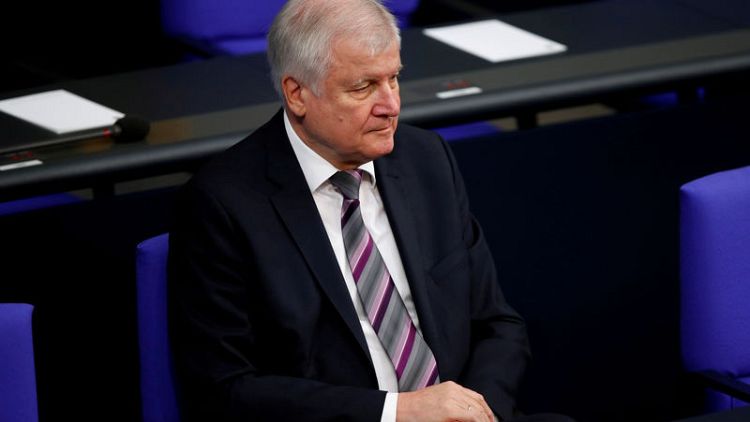By Tassilo Hummel and Maria Sheahan
BERLIN (Reuters) - Horst Seehofer, a critic of Chancellor Angela Merkel's liberal asylum policies, said on Monday he would step down as chief of the powerful Bavarian regional sister party to Merkel's conservatives but remain Germany's Interior Minister.
"I will give up my office as party chief," Seehofer told journalists in the eastern German city of Bautzen, confirming media reports published over the weekend.
Sources at the Christian Social Union (CSU) told Reuters on Sunday that Seehofer had told party members that he wanted to resign as their leader.
Seehofer's announcement follows Merkel's own declaration that her fourth term as chancellor will be her last, and that she will step down as leader of the Christian Democrats (CDU), the national conservative party that has been in power twice as often as not in the post-war era.
The CSU has dominated politics in post-war Bavaria, using its solid grip on one of Germany's largest and richest states to ensure outsized influence in national government whenever the conservatives run the country.
But both the national and regional conservative parties have faced their worst electoral performances in decades over the past two years, as the far right has gained ground by challenging Merkel's immigration policy.
Seehofer, 69, said on Monday that his decision to resign as party leader was not motivated by the CSU's losses in Bavarian state elections in October, when the party suffered its worst results since 1950 as his anti-immigration campaign backfired.
"I am taking this decision to make 2019 a year of renewal for the CSU," he said.
He said the timing of his resignation, after 10 years at the helm of the party, was still being discussed and it would be announced to the public during the course of the week. His decision to resign as party leader would have no effect on his post as federal interior minister.
Some had hoped that an exit from his ministerial post could stabilise the governing coalition of Merkel's CDU-CSU conservative grouping and Germany's Social Democrats (SPD).
The coalition has been shaken by disputes over immigration, and the two blocs suffered painful losses in a national election last year.
Seehofer twice brought the government to the verge of collapse last year, including by threatening in the summer to prevent migrants from entering Germany via Austria.
(Editing by Peter Graff)
